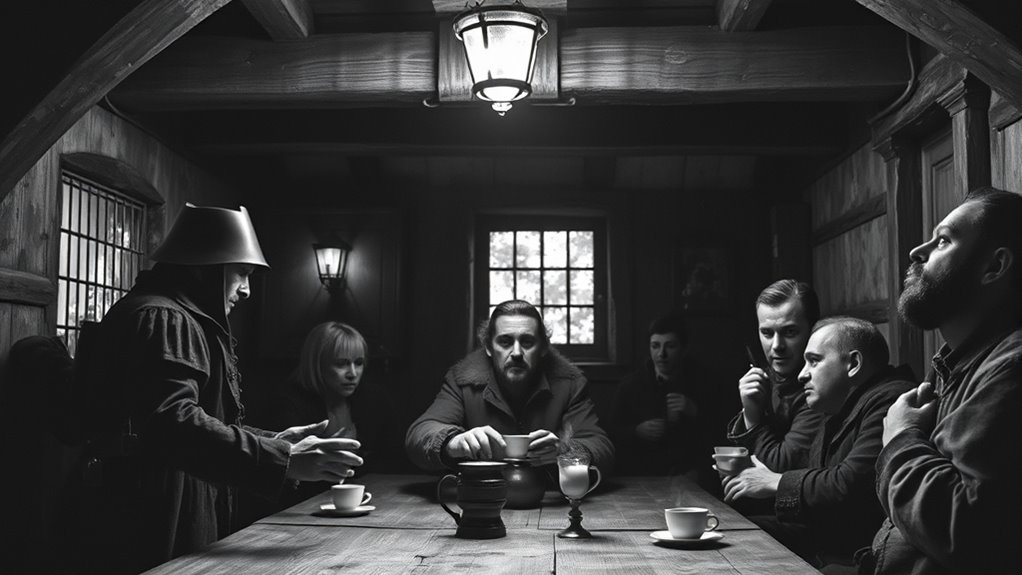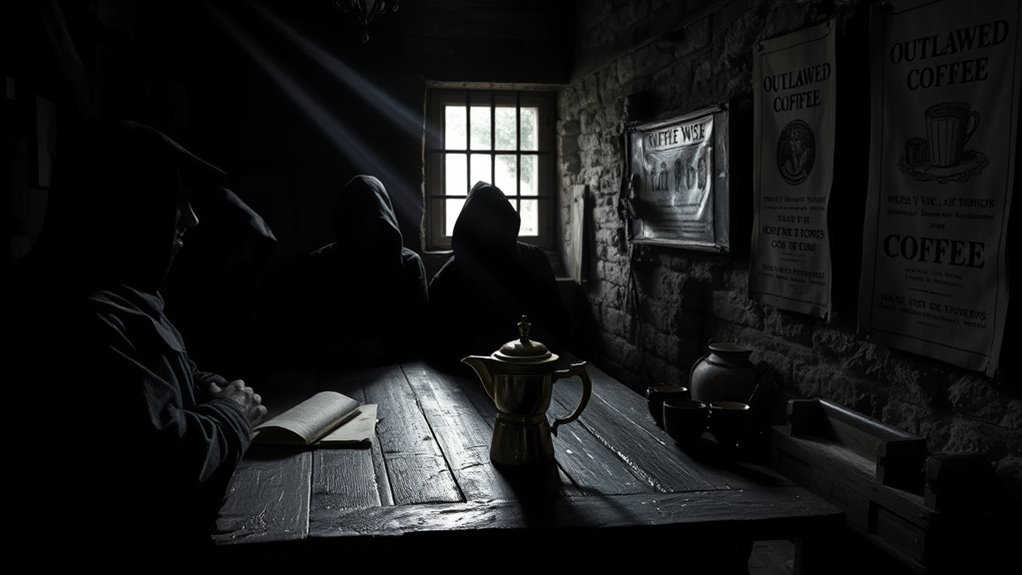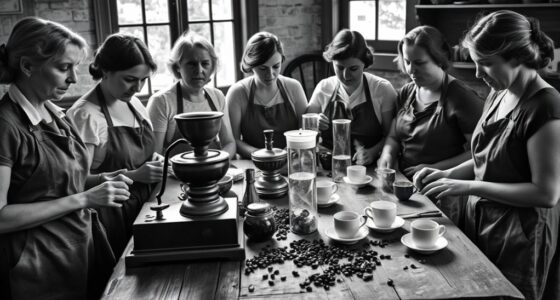Throughout history, coffee has faced bans in places like the Ottoman Empire, 16th-century Mecca, and parts of Europe due to fears of social unrest, moral decline, or health concerns. Governments often restricted or outlawed coffee to control social gatherings or protect economic interests, like tea industries. Despite these bans, coffee’s popularity persisted and eventually resounded globally. If you keep exploring, you’ll discover more about the fascinating stories behind these prohibition moments and their lasting impact.
Key Takeaways
- Coffee was banned in the Ottoman Empire in the 16th and 17th centuries due to political dissent and social unrest.
- European countries in the 18th century attempted to restrict coffee to protect local tea industries and curb vice.
- During the U.S. Prohibition (1920-1933), some regions temporarily banned coffee fearing it as a stimulant.
- Public health concerns about caffeine led to temporary bans or restrictions in various countries throughout history.
- Despite numerous bans, coffee’s cultural significance and resilience caused it to eventually be embraced worldwide.

Have you ever wondered why certain beverages suddenly disappear from shelves or become illegal? “Banned Brew” explores the captivating story behind a once-popular drink that faced prohibition due to health concerns, regulatory battles, and social debates. Coffee, now a staple worldwide, wasn’t always so accepted. In fact, it has experienced its fair share of historic bans, where governments and societies questioned its safety and influence. These bans weren’t random; they stemmed from fears about health, morality, and economic control.
Discover the intriguing history of coffee bans driven by health fears, social unrest, and economic motives.
In the 16th and 17th centuries, coffee’s rise in popularity sparked controversy. Some authorities believed it was a corrupting influence, undermining social order. In parts of the Ottoman Empire, coffeehouses became centers of political discussion, which alarmed rulers wary of dissent. As a result, coffee was temporarily banned in certain regions, driven by fears it encouraged rebellion or immoral behavior. These early efforts were often short-lived, but they set a precedent for future attempts at prohibition.
Throughout history, various countries have imposed coffee prohibition during times of social upheaval or moral panic. For example, in the 18th century, some European nations tried to curb coffee consumption, associating it with vice and sedition. The bans were often motivated by economic interests too—rulers wanted to protect local tea industries or maintain control over popular social venues. Despite these efforts, coffee’s popularity persisted, and bans were eventually lifted, but the episode remains a fascinating glimpse into how societal fears can lead to historic bans on common beverages.
The most notable coffee prohibition occurred in the early 20th century during Prohibition in the United States, but it was less about coffee itself and more about alcohol. Still, the era reflected a broader tendency to regulate daily life and habits, which occasionally extended to other substances and foods. Peculiarly, some regions once considered coffee a dangerous stimulant, leading to temporary bans or restrictions. These measures often failed because of the drink’s deep-rooted cultural significance and widespread appeal.
Additionally, the influence of public health concerns played a role in some bans, as authorities debated whether caffeine was harmful in large quantities. Today, coffee is celebrated globally, but the history of its bans reveals how social, political, and health concerns shape what we consume. Governments and societies have historically wavered in their acceptance, sometimes banning a beverage they later embraced. These historic bans serve as reminders that our relationship with food and drink is often complex, influenced by fears, power struggles, and cultural shifts. Coffee’s journey from forbidden substance to beloved staple underscores its resilience and the changing nature of societal norms.
Frequently Asked Questions
Were There Any Health Benefits Linked to Banned Coffee?
You might wonder if banned coffee had any health benefits. While the bans focused on social or economic reasons, some reports suggest that coffee’s health impact includes potential nutritional benefits like antioxidants and improved mental alertness. Despite restrictions, coffee’s positive effects on health, such as reduced risk of certain diseases, remain notable. So, even when outlawed, its nutritional benefits and health impact continue to be recognized by many.
How Did Coffee Bans Affect Local Economies Historically?
You see, coffee bans historically caused significant economic impacts, disrupting local trade and livelihoods. When authorities outlawed coffee, farmers, traders, and cafes faced trade disruptions, leading to financial losses. These bans often reduced tax revenues and hurt economies dependent on coffee exports. In some cases, black markets emerged, further destabilizing local economies. You can imagine how such restrictions would ripple through communities, affecting both commerce and social life.
Were Any Specific Coffee Types Targeted During Bans?
Ever wonder if specific coffee types faced bans? During restrictions, authorities often targeted decaffeinated varieties, fearing they might mask illegal caffeine use. Coffee bean restrictions focused on particular beans, especially those linked to certain regions or qualities. Like a game of whack-a-mole, banning specific types aimed to control trade and consumption. So yes, certain coffee types, especially decaffeinated ones and restricted beans, were deliberately targeted to curb their popularity.
How Did Coffee Drinkers Secretly Access Banned Coffee?
You probably wonder how coffee drinkers secretly access banned coffee. They relied on underground cafes and smuggling networks to get their fix. These covert spots offered a safe space to enjoy coffee away from authorities, while smugglers discreetly transported beans across borders. By using secret routes and hidden venues, enthusiasts kept their passion alive, circumventing bans and ensuring coffee’s presence in their lives despite restrictions.
Did Coffee Bans Influence Global Trade Routes?
Imagine trade routes trembling like a leaf in a storm—that’s what coffee bans caused. You’d see trade disruptions ripple across continents, forcing smugglers to craft secret networks that defied authorities. These disruptions shifted global commerce, making coffee a prize worth risking everything. Your daily cup’s journey became a daring tale of clandestine moves, showing how bans transformed trade, fueling innovation and resilience among those who refused to give up their beloved brew.
Conclusion
So, next time you sip your favorite coffee, remember how this beloved brew has faced the wrath of bans and bans, like a phoenix rising from ashes. It’s a reminder that even the most cherished comforts can face opposition, yet their spirit endures. Coffee’s story is a demonstration of resilience—showing that sometimes, the most forbidden things are the ones worth fighting for. Savor it, knowing its history is as rich as its flavor.









